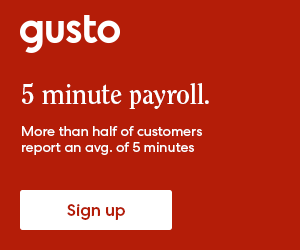There’s a lot of posts and blogs out there how about how to create an online business, but almost all of it is incomplete. Why? Because they hardly ever make any mention whatsoever about the legal steps you should take to actually register your business, which will allow you to optimize your taxes, protect your privacy, and reduce your liability if anything in the business goes wrong. For example, let’s say you run a dropshipping business and ordered a whole bunch of stuffed animals off some popular supply website – and to your shock – these cute, fuzzy elephants have a propensity for spontaneously combusting. Err….uh-oh. While this example is extreme to prove a point – anything can become a large problem for your business that makes your personal assets as well as your business assets vulnerable. That’s why you cannot afford to be shortsighted when it comes to the legal side of your business. If you get everything sorted out now – it could very well save you thousands or more down the line. So here’s a Legal Sloth-approved list of tools you can take to get your business up and running while keeping legal in mind. It’s possible Legal Sloth may receive an affiliate fee for some of the tools listed below if you choose to purchase any products/services from them. As always – please remember that none of this is legal advice, and this website (nor the attorney who wrote this blog) represents you.
- Register your business and hire a Registered Agent!

Before you do anything, it would be a good idea to register your business. This means creating either an LLC or Delaware-C corporation or some other entity type. One of the major benefits of going through a registration of your business is that it can help significantly protect your personal assets if something with the business goes wrong and you get sued. If you have registered your business correctly, and if you don’t treat the business funds as your own personal bank account and you truly keep your personal assets separate from your business assets, then if you ever get sued – your personal assets have a much stronger change of being protected. A person who sues your business should not be able to come for your personal assets if you registered your business correctly – they should only be able to sue you to recover damages that would come out of your business assets. So if you personally own your home, car, or even other businesses – all of those assets should be protected. Someone who decides to sue you because your business harmed them in some way should only be able to sue the business that harmed them (and the assets of that business) – not all of the other assets the owner of that business happens to have. There are many other benefits to registering a business. You can optimize your taxes by paying yourself a salary from the business and then taking distributions or an owner’s draw from the business, and those distributions will not be subject to payroll taxes or additional social security / medicare taxes. If you’re interested in learning more about optimizing your taxes – you should reach out to a certified accountant. As far as actually registering the business goes, I really like Northwest Registered Agent for business registrations. I have had prior clients use them with good success. Whether you want to register an LLC or corporation or some other entity, they offer what I feel is a very high value proposition for the cost. They can also help protect your personal information, because when you do go register your business – if you don’t use a registered agent – you will likely have to use a personal address (unless you own an actual business property somewhere). But if you use a registered agent, you can use the registered agent address and protect your own private information. Keep in mind many states will not allow you use a PO box to register your business – so a registered agent is often a must when trying to keep your personal info private when registering your business.
2. Create your website.
The best way to reach customers and scale your business is of course to create a website. Host it on bluehost. Make it pretty and easy to edit with Divi. There are plenty of tools out there that allow you to create a site, but these tools (Bluehost, Divi) are among the absolute best and trusted by literally millions of businesses.
3. Payroll is a headache. Hire a service like Gusto to take it off your hands.

If you register your business, then you’ll need to pay yourself something. You may also need to pay contractors (more on contractors below). If you take this on yourself, you may save a few dollars a month – but it will cost you tons of time and lots of headaches and stress. It is really complicated and cumbersome to figure out how to actually calculate payroll taxes. And it’s a nuisance to keep records of all the W9s for your contractors and everything you pay them – whether you pay them monthly or by project, etc – just take the nuisance off your plate and hire a third party service to calculate all the fees, taxes, and withholdings when you pay yourself and others. This will also bring you peace of mind when it comes around to tax season and you need to ensure you did everything correctly to avoid an audit – or suvive an audit unscathed. It’s a lot easier to point the IRS to your Gusto account to prove you did everything correctly. Also, Gusto allows you to give access to your accountant, and your accountant will certainly appreciate how organized everything is in Gusto. If your accountant charges hourly, Gusto may even pay for itself because your accountant will be much more efficient with their time in a platform like Gusto than going through a bunch of messy emails from you (take it from my personal experience…)
4. Hire contractors from a site like Fiverr.
There’s an old maxim that I find incredibly valuable: Work ON your business, not IN your business. If you treat yourself as a glorified employee rather than an owner, you’re not going to scale. And if you’re trying to build a business to make money – then scaling is what you should be focusing on 100% of the time. One of the best ways to scale is to farm out the day-to-day operations of your business where possible. Do you run an SEO or copy business? Dropshipping? Logo creation? Whatever it is – hire the services that you can on Fiverr and save yourself time. Successful business owners do not become successful because they’re the best at what they do – they become successful because they hire and delegate better than anyone else. We each only have 24 hours in a day. There are only so many customers you can personally serve yourself. So don’t bother. Save yourself time, scale your business, and go to Fiverr to hire contractors and find professional services you business may need
5. Start generating a newsletter and use an email subscription service like Moosend.

There are tons of email marketing services out there, but for the cost – I really like moosend. They have tons of templates and are experts at helping email marketing convert subscribers to paying customers. One thing that’s highly valuable about investing time and money into your email list is that it’s something you can always refer to. If you invest time and money into growing your google rank or social media profile – those algorithms can always change, and your rank could plummet due to not wrongdoing of your own. A robust email list is one of the best methods you can take to safeguard your online presence and ability to create revenue.
6. Use a separate bank account.
One of the easiest ways to make a HUGE mistake when first starting your online business is to not create a separate bank account for your business. On the business side, this is bad because it makes it more difficult to truly understand your profit and loss if your business revenue and costs are intermingled with your personal earnings and expenses. You’ll want to be able to track the revenue and expenses of your business not only to evaluate the profitability of your business – but also in order to correctly claim your tax deductions. You can write off a lot of expenses you incur for your business, which could result in significant tax savings. And if you hire an accountant to help you correctly claim all of your business deductions, they will either refuse to comb through your personal account to try to piece together what’s a business expense and what’s a personal expense – or they will charge you hourly and you will pay a high price for not being organized with a separate account. On the legal side, you risk losing all of your liability protection if you commingle your business assets and your personal assets. If you don’t keep the accounts separate, and someone sues you because of an issue with your business, then a judge may find you don’t deserve any liability protection because you are commingling your business assets with your personal assets. That essentially means there is no separate business and therefore the assets should not be separated. This is called “piercing the corporate veil” – when a judge determines your personal assets are fair game in the event you are sued – and therefore you get no liability protection – because you treated the business profits as your own personal bank account. So – make sure you keep a separate bank account. There are lots of bank accounts out there of course, but there are two I particularly like. I tend to shy away from big banks because I find I typically get better customer service at the smaller banks. I really like Comenity (now Bread Financial) and Axos. Nerdwallet, which is an awesome finance info website, gives very high marks to both Comenity and Axos.
